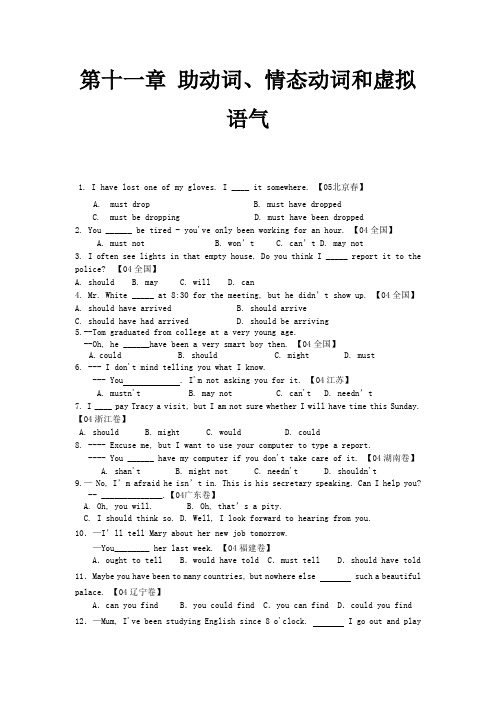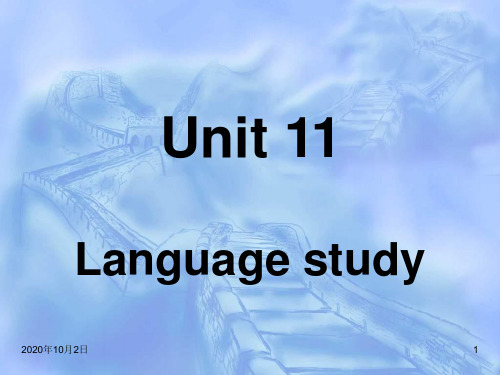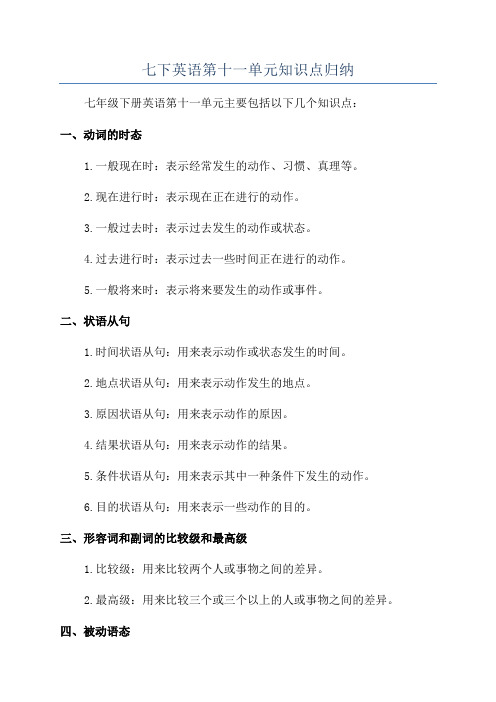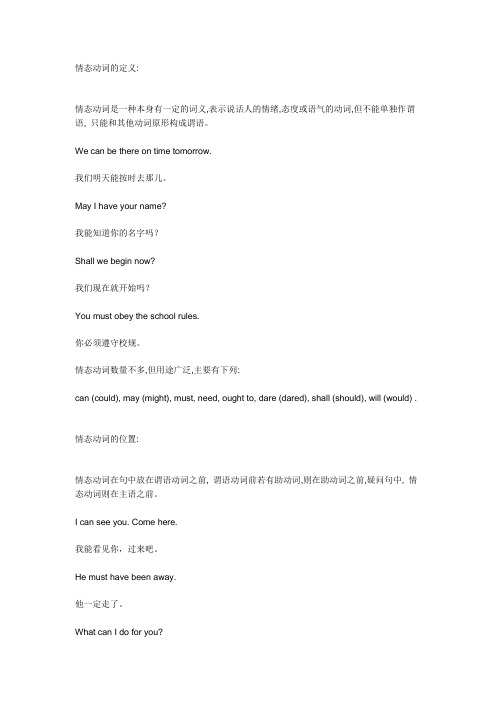11第十一章 情态动词
高中英语语法专项宝典11助动词、情态动词和虚拟语气

第十一章助动词、情态动词和虚拟语气1. I have lost one of my gloves. I ____ it somewhere. 【05北京春】A. must dropB. must have droppedC. must be droppingD. must have been dropped2. You ______ be tired - you've only been working for an hour. 【04全国】A. must notB. won’tC. can’tD. may not3. I often see lights in that empty house. Do you think I _____ report it to the police? 【04全国】A. shouldB. mayC. willD. can4. Mr. White _____ at 8:30 for the meeting, but he didn’t show up. 【04全国】A. should have arrivedB. should arriveC. should have had arrivedD. should be arriving5.--Tom graduated from college at a very young age.--Oh, he ______have been a very smart boy then. 【04全国】A. couldB. shouldC. mightD. must6. --- I don't mind telling you what I know.--- You . I'm not asking you for it. 【04江苏】A. mustn'tB. may notC. can'tD. needn’t7. I ____ pay Tracy a visit, but I am not sure whether I will have time this Sunday. 【04浙江卷】A. shouldB. mightC. wouldD. could8. ---- Excuse me, but I want to use your computer to type a report.---- You ______ have my computer if you don't take care of it. 【04湖南卷】A. shan'tB. might notC. needn'tD. shouldn't9.—No, I’m afraid he isn’t in. This is his secretary speaking. Can I help you? -- ______________.【04广东卷】A. Oh, you will.B. Oh, that’s a pity.C. I should think so.D. Well, I look forward to hearing from you.10.—I’ll tell Mary about her new job tomorrow.—You________ her last week. 【04福建卷】A.ought to tell B.would have told C.must tell D.should have told 11.Maybe you have been to many countries, but nowhere else such a beautiful palace. 【04辽宁卷】A.can you find B.you could find C.you can find D.could you find 12.—Mum, I've been studying English since 8 o'clock. I go out and playwith Tom for a while?—No, I'm afraid not. Besides, it’s raining outside now.【04辽宁卷】A.Can't B.Wouldn't C.May not D.Won’t13. — Who is the girl standing over there?— Well, if you know, her name is Mabel. 【04天津卷】A. mayB. canC. mustD. shall14. “The interest______ be divided into five parts, according to the agreement mad e by both sides,” declared the judge. 【04重庆卷】A. mayB. shouldC. mustD. shall15. Children under 12 years of age in that country ________ be under adult supervision when in a public library. 【04上海卷】A. mustB. mayC. canD. need16. - Isn't that Ann's husband over there?- No, it _______ be him. I'm sure he doesn't wear glasses. 【04全国】A. can'tB. must notC. won'tD. may not17. A left luggage office is a place where bags be left for a short time, especially at a railway station. 【NMET2003】A.should B.can C.must D.will18.How you say that you really understand the whole story if you have covered only part of the article ? 【2003上海】A.can B.must C.need D.may19. – Is John coming by train? 【NMET2002】– He should, but he _______not. He likes driving his car.A. mustB. canC. needD. may20.It has been announced that candidates_______remain in their seats until all the papers have been collected. 【2002上海】A. canB. willC. mayD. shall21.It is hard for me to imagine what I would be doing today if I in love, at the age of seven, with the Melinda Cox Library in my hometown. 【2002上海】A. wouldn’t have fallenB. had not fallenC. should fallD. were to fall22.I was really anxious about you. You _____ home without a word. 【NMET2001】A. mustn’t leaveB. shouldn’t have leftC. couldn’t have leftD. needn’t leave23. --- Are you coming to Jeff's party? 【NMET2000】--- I'm not sure . I ________go to the concert instead.A.must B.would C.should D.might24. --Will you stay for lunch? 【NMET1999】--Sorry, _______. My brother is coming to see me.A. I mustn'tB.I can'tC. I needn'tD.I won't25. --I stayed at a hotel while in New York. 【NMET1998】--Oh, did you? You_____ with Barbara.A. could have stayedB. could stayC. would stayD. must have stayed26. --When can I come for the photos? I need them tomorrow afternoon.-- They _____be ready by 12:00. 【NMET1998】A. canB. shouldC. mightD. need27. The fire spread through the hotel very quickly but everyone_______ get out. 【NMET1997】A. had toB. wouldC. couldD. was able to28. Johnny, you play with the knife, You ____ hurt yourself. 【NMET1996】A. won't; can'tB. mustn't; mayC. shouldn't; mustD. can't; shouldn't29. You didn't let me drive. If we in turn, you so tired. 【NMET1996】A. drove, didn't getB. drove; wouldn't getC. were driving; wouldn't getD. had driven; wouldn't have got30. When a pencil is partly in a glass of water, it looks as if it . 【NMET1995】A. breaksB. has brokenC. were brokenD. had been broken31. ---There were already five people in the car but they managed to take me as well.---It a comfortable journey. 【NMET1995】A. can't beB. shouldn't beC. mustn't have beenD. couldn't have been32. It’s nearly seven o’clock. Jack _________be here at any moment.【NMET1995】A. mustB. needC. shouldD. can33. —Shall I tell John about it? 【MET1994】—No, you ______ . I've told him already.A. needn'tB. wouldn'tC. mustn'tD. shouldn't34. I told Sally how to get here, but perhaps I ______ for her. 【MET1994】A. had to write it outB. must have written it outC. should have written it outD. ought to write it out35. I didn't see your sister at the meeting. If she ______ , she would have met mybrother. 【MET1994】A. has comeB. did comeC. cameD. had come【答案与解析】1. B该题考查情态动词的用法。
unit11 Language studyPPT课件

Grammar (workbook)
▪1. What decision
have they made?
▪2. Have you fed the
pigs yet?
2020年10月2日
16
▪3. You haven’t given them anything to eat.
▪4. We have already discussed this question.
2020年10月2日
17
▪5. The doctor is examining this big panda.
▪6. A nurse is testing its blood.
2020年10月2日
18
▪7. He is weighing the
baby elephant.
▪8. Nobody has seen or
2020年10月2日
24
7. I want to join the school band, but on the other hand I have to spend more time studying English.
2020年10月2日
25
演讲完毕,谢谢观看!
Thank you for reading! In order to facilitate learning and use, the content of this document can be modified, adjusted and printed at will after downloading. Welcome to download!
汇报人:XXX 汇报日期:20XX年10月10日
26
unit11 Language study

2. This album contains her best songs of the past few years.
3. The new treatment, which combines traditional Chinese medicine with modern western medicine, works well.
▪2. Have you fed the pigs yet?
▪3. You haven’t given them anything to eat.
▪4. We have already discussed this question.
▪5. The doctor is examining this big pa song is being sung by everyone in the country.
▪6. This song was written while he was fishing.
▪7. The new music video is played several times a day.
▪2. The song of the 1998 World Cup was performed by Ricky Martin.
▪3.The performance will be given in the Capital Concert Hall.
▪4. He knew that he would be invited to perform in the New Year’s Concert.
4. The fire spread from the factory to the houses nearby in less than half an hour.
七下英语第十一单元知识点归纳

七下英语第十一单元知识点归纳七年级下册英语第十一单元主要包括以下几个知识点:一、动词的时态1.一般现在时:表示经常发生的动作、习惯、真理等。
2.现在进行时:表示现在正在进行的动作。
3.一般过去时:表示过去发生的动作或状态。
4.过去进行时:表示过去一些时间正在进行的动作。
5.一般将来时:表示将来要发生的动作或事件。
二、状语从句1.时间状语从句:用来表示动作或状态发生的时间。
2.地点状语从句:用来表示动作发生的地点。
3.原因状语从句:用来表示动作的原因。
4.结果状语从句:用来表示动作的结果。
5.条件状语从句:用来表示其中一种条件下发生的动作。
6.目的状语从句:用来表示一些动作的目的。
三、形容词和副词的比较级和最高级1.比较级:用来比较两个人或事物之间的差异。
2.最高级:用来比较三个或三个以上的人或事物之间的差异。
四、被动语态1. 被动语态的基本构成:be + 过去分词。
2.被动语态的用法:表示动作的承受者或行为的对象,强调动作的发生而不强调动作的执行者。
五、情态动词1. can:表示能力或许可。
2. must:表示必须或肯定。
3. may:表示可能或许可。
4. need:表示需要。
5. should:表示应该或建议。
6. would like:表示意愿。
六、宾语从句1.宾语从句是一种名词性从句,充当宾语的作用。
2. 宾语从句的引导词有that, if, whether等。
七、祈使句1.祈使句用来表示命令、请求、建议、劝告等。
2.没有主语,动词用原形。
以上就是七年级下册英语第十一单元的主要知识点归纳。
在学习中,我们要掌握动词的时态,熟练运用状语从句,掌握形容词和副词的比较级和最高级的用法,了解被动语态的构成和用法,掌握情态动词的用法,能够正确使用宾语从句和祈使句。
通过练习和巩固这些知识点,可以提高英语表达能力。
情态动词11

情态动词的定义:情态动词是一种本身有一定的词义,表示说话人的情绪,态度或语气的动词,但不能单独作谓语, 只能和其他动词原形构成谓语。
We can be there on time tomorrow.我们明天能按时去那儿。
May I have your name?我能知道你的名字吗?Shall we begin now?我们现在就开始吗?You must obey the school rules.你必须遵守校规。
情态动词数量不多,但用途广泛,主要有下列:can (could), may (might), must, need, ought to, dare (dared), shall (should), will (would) . 情态动词的位置:情态动词在句中放在谓语动词之前, 谓语动词前若有助动词,则在助动词之前,疑问句中, 情态动词则在主语之前。
I can see you. Come here.我能看见你,过来吧。
He must have been away.他一定走了。
What can I do for you?你要什么?How dare you treat us like that!你怎能那样对待我们!情态动词的特点:情态动词无人称和数的变化, 情态动词后面跟的动词需用原形,否定式构成是在情态动词后面加"not"。
个别情态动词有现在式和过去式两种形式, 过去式用来表达更加客气, 委婉的语气, 时态性不强, 可用于过去,现在或将来。
He could be here soon.他很快就来。
We can't carry the heavy box.我们搬不动那箱子。
I'm sorry I can't help you.对不起,我帮不上你。
情态动词的用法:can (could) 表示说话人能,可以,同意,准许,以及客观条件许可,could 为can 的过去式。
七年级下册unit11知识点

七年级下册unit11知识点七年级下册的Unit11主要涵盖了有关“can”的用法及其它一些相关的语法知识。
在这个单元中,学生将学习到如何使用情态动词can来表达能力和能够做某事的能力等概念。
以下是本单元中需要掌握的知识点。
一、can的用法can是表示能力和可能性的情态动词,用于表达一些能够做的事情或者是不可能做的事情。
can通常与动词原形搭配,形成肯定句和否定句,以及疑问句和回答。
1. 肯定句:I can swim. 我会游泳。
He can speak English. 他会说英语。
2. 否定句:I can't swim. 我不会游泳。
He can't speak English. 他不会说英语。
3. 疑问句:Can you swim? 你会游泳吗?Can he speak English? 他会说英语吗?4. 回答:Yes, I can. 是的,我会。
No, I can't. 不,我不会。
二、情态动词的一些特点在使用情态动词时,需要注意以下一些特点:1. 情态动词没有人称和数的变化。
例如:He can swim. They can swim. (情态动词can没有人称和数的变化)2. 情态动词后面跟动词原形。
例如:She can dance. (can和dance搭配使用,dance用原形)3. 情态动词没有时态的变化。
例如:I can speak Chinese. (can没有时态的变化)三、其它一些相关知识点1. 建议使用情态动词should。
should表示“应该”、“应当”,用于给出建议和指导。
比如:You should drink more water. 你应该多喝水。
2. 表示可能性的情态动词may。
may表示“可能”,用于表达不确定的事情,或者是给出建议和猜测。
比如:He may be at home. 他可能在家。
3. 表示必要性和可能性的情态动词must。
高三英语一轮复习 语法提分微点案 考点11 情态动词和虚拟语气课件
4.I've ordered some pizza, so we __n_e_e_d___ not worry about cooking when we get home tired.
解析:句意:我已经预订了一些比萨饼,所以当我们到家感到累的时 候就不必担心做饭的事了。根据句意可知答案为need。
(2) 与 过 去 情 况 相 反 : 从 句 用 过 去 完 成 时 , 主 句 用 would/could/might/should+have done。
(3)与将来情况相反:从句用过去式(did)/should+do/were to do,主句 用would/could/might/should+do。
5.I still remember my happy childhood when my mother __w__o_u_ld__ take me to Disneyland at weekends.
解析:句意:我仍然记得我快乐的童年,那时候我妈妈常常在周末带 我去迪斯尼乐园。would“过去常常”。
7.It is required by law that a driving test __(s_h_o_u_l_d_)_b_e_t_a_k_e_n_ (take) before a man gets a license.
解析:句意:法律规定,一个人在获得驾照之前要先参加驾照考试。 It is required that ...中,that从句的谓语动词用“should+动词原形”,其中 should 可 以 省 略 ; 又 因 为 test 与 take 之 间 是 被 动 关 系 , 故 用 被 动 语 态 , 即 (should)be taken。
5.虚拟语气在其他从句中的运用 (1)would rather所接的从句中的谓语动词用一般过去式(对现在虚拟)或 者过去完成式(对过去虚拟) I would rather you stayed at home now. 我宁愿你现在待在家里。 (2)It is (high) time (that) ...句型中谓语动词用一般过去式或should+动 词原形,其中should不可省略 It's high time that we left/should leave. 该到我们离开的时候了。
七年级英语unit11知识点
七年级英语unit11知识点七年级英语Unit 11知识点在学习英语的过程中,知识点是非常重要的,它可以帮助我们更好地理解英语的语法和用法。
在七年级英语中,Unit 11也是一个重要的知识点,它主要包括了以下几个方面的内容:一、形容词和副词的比较级和最高级在英语中,形容词和副词有比较级和最高级的形式,用来表示比较两个或多个事物的大小、高低、快慢等情况。
比较级前面一般要加上more或者er,最高级前面则要加上the most或者est。
例如:1. This book is more interesting than that one.(这本书比那本书更有趣。
)2. She speaks English better than her brother.(她比她的兄弟说英语说得更好。
)3. That is the tallest building in the city.(那是城里最高的建筑。
)4. This is the most delicious food I have ever tasted.(这是我吃过的最好吃的食物。
)二、情态动词can、could、may、might的用法情态动词在英语中有很多,而在Unit 11中,我们主要学习can、could、may、might这4个情态动词的用法。
1. can: 表示能够、会、可以做某事例如:- I can swim very well.(我游泳游得很好。
)- He can speak three languages.(他会说三种语言。
)- You can go home now.(你现在可以回家了。
)2. could: 表示过去的能力、允许和请求例如:- I could run fast when I was young.(我年轻时跑得很快。
)- Could you please help me carry this bag?(你能帮我拿这个包吗?)- Could you open the window, please?(请你开一下窗户好吗?)3. may: 表示允许、可能、祝愿或请求例如:- May I borrow your pencil, please?(请问可以借你的铅笔吗?)- It may rain tomorrow.(明天可能会下雨。
九年级第十一单元sectionA知识点
九年级第十一单元sectionA知识点回顾九年级第十一单元Section A是一个语法单元,主要涉及一些基础的知识点,如动词的时态、情态动词的用法等。
通过巩固和复习这些知识点,我们可以提高自己的语言水平。
本文将围绕这些知识点展开讨论,并提供一些相关例句。
动词的时态是英语语法中的重要部分。
在英语中,动词的时态表示动作或状态发生的时间。
根据不同的时间,我们有过去时(simple past)、现在时(simple present)和未来时(simple future)等。
过去时用于表示已经发生过的动作或状态,常常与时间状语词,如yesterday、last week等连用。
现在时用于表示正发生的动作或状态,比如我们经常用到的现在进行时,用于表示正在进行的动作,常与现在时间状语词,如now、at the moment等连用。
未来时用于表示将要发生的动作或状态,通常与时间状语词,如tomorrow、in the future等连用。
情态动词是表示说话人的意愿、能力、推测等方面的动词。
常用的情态动词有can、could、may、might、shall、should、will、would、must等。
这些情态动词在句子中通常用于表达一种强调或推测的语气。
比如,can用于表示能力或允许,may用于表示可能性,shall用于表示命令或请求,must用于表示必要性等。
除了上述情态动词的用法外,情态动词还可以用于构成否定、疑问、条件等句子。
下面我们将通过一些例句来加深对动词的时态和情态动词的理解。
1. 过去时- He studied English last night.(他昨晚学习了英语。
)- They visited their grandparents yesterday.(他们昨天去看望了他们的祖父母。
)2. 现在时- She is playing basketball now.(她现在正在打篮球。
)- They usually go to school by bus.(他们通常乘公交车上学。
Unit11ConflictandCompromise语法知识点扫盲
Unit11 Conflict and promise 语法知识点扫盲情态动词观察句子Tom ①could have got to school on time yesterday morning, but he was held up on the way to school in a heavy traffic jam.“Tom, you ②should have said sorry to me for ing late,” said Mr Smith.“I ③must be too eager to go into the classroom. I ④can't be too sorry for my ing late!” said Tom.“Oh, my God, I ⑤must have left my English textbook at home after I finished my homework last night,” said Tom, “⑥Shall I share it with my deskmate?”“OK! You ⑦may/might as well bring your own textbook next time, but for this time you ⑧can share it with your deskmate,” said Mr Smith. “Now, class, ⑨would you please turn to Page 11? ⑩Shall we begin our lesson?”感悟:1.情态动词可以表示能力、许可、必要性、可能性、责任和义务、建议、要求和打算等;2.加黑处①中的could后跟have done,表示推测,意为“本来能够……”;3.加黑处②中的should后跟have done,表示推测,意为“本应该……”;4.加黑处③、⑤中的must表示猜测、推测,意为“想必,一定”;5.加黑处④是固定结构,表示“无论……也不为过”;6.加黑处⑥、⑩中的shall用于第一人称疑问句中,表示说话人征求对方的意见或向对方请示;7.加黑处⑦是固定结构“may/might as well+动词原形”,意为“最好,倒不如”;8.加黑处⑧中的can表示许可;9.加黑处⑨中的would 表示要求。
- 1、下载文档前请自行甄别文档内容的完整性,平台不提供额外的编辑、内容补充、找答案等附加服务。
- 2、"仅部分预览"的文档,不可在线预览部分如存在完整性等问题,可反馈申请退款(可完整预览的文档不适用该条件!)。
- 3、如文档侵犯您的权益,请联系客服反馈,我们会尽快为您处理(人工客服工作时间:9:00-18:30)。
第十一章 情态动词基础扫描 情态动词跟助动词一样除了用于简短回答等特殊情况外,一般不能单独用作谓语,一定要与实义动词连用。情态动词与助动词的区别在于:情态动词本身具有一定的词汇意义,可以表示意愿、可能性、推测、义务等含义(具体内容见下表)。情态动词一直是高考中的重点考查项目,近几年的高考题侧重于借助于具体的语境来考查考生对情态动词基本用法的理解和掌握,因此只有全面学习各个情态动词的用法并结合语境进行练习,才能真正掌握该语法项目。 情态动词 非推测性用法 推测性用法 can/could may/might will/would should/ought to must 表示“能力”、“许可” 表示“许可” 表示“意志” 表示“义务” 表示“义务” 表示“可能” 表示“可能” 表示“推测” 表示“必然” 表示“必然”
不确定性 → 确定性 might→may→could→can→should→ought to→would→will→must
need 表示“需要、必要” — shall 表示“意愿、建议” — dare 表示“敢” — used to 表示“过去常常或过去曾” — 考点透析与典题示例 考点1:情态动词的基本用法 1.Can 过去式could;否定缩略式can’t/couldn’t 基本含义:“能;可能” 用法 经典例句 1)表示能力 Can you speak Chinese? 你会说汉语吗?
2)表示允许或许可,请求或要求。 You can’t park here. 你不能在这停车。 Can I take you home? 我能送你回家吗? Can you help me with this question? 你能帮我解决一下这个问题吗? 4)表逻辑上的客观可能性。 We can travel to Beijing by air. 我们可以乘飞机去北京。 5)表推测(用于疑问句、否定句中);could还可以在肯定句中表示不太确定的推测。 The bell is ringing — who can it be? 门铃在响,可能是谁呢?
It couldn’t be Tom. He has gone to Shanghai. 不可能是汤姆,他已经去上海了。 He could be on his way now. 他可能已经在路上了。 考点
链接
在表示对过去情况的推测时
用“can/could have done”结构。(详见考点4。) 6)用于提出建议。 We can go swimming. 我们可以去游泳。 7)表示惊异、怀疑、疑惑、不相信的态度。(常用于否定句、疑问句。) I can’t believe it. 我简直不能相信。 How can you treat me like that? 你怎么能那样对待我? 8)有时。 It can be quite cold here at night. 有时晚上这里很冷。 例1: The biggest problem for most plants, which _____ just get up and run away when threatened, is that animals like to eat them. A. shan’t B. can’t C. needn’t D. mustn’t 例2: — I’ve taken someone else’s green sweater by mistake. —It _____ Harry’s. He always wears green. A. has to be B. will be C. mustn’t be D. could be 例3: There’s no light on-they _____ be at home. A. can’t B. mustn’t C. needn’t D. shouldn’t 例4: —Mum, I’ve been studying English since 8 o’clock. _____ I go out and play with Tom for a while? —No, I’m afraid not. Besides, it’s raining outside now. A. Can’t B. Wouldn’t C. May not D. Won’t 例5: A left luggage office is a place where bags _____ be left for a short time, especially at a railway station. (03) A. should B. can C. must D. will 例6: Mr. Bush is on time for everything. How _____ it be that he was late for the opening ceremony? A. can B. should C. may D. must 例7: The World Wide Web is sometimes jokingly called the World Wide Wait because it _____ be very slow. A. should B. must C. will D. can 2.must/have(got) to 否定缩略式:mustn’t 基本含义:“必须;肯定” 用法 经典例句 1)表义务或必要性;表示没有义务或必要时,用needn’t或don’t have to。 We must keep our words. 我们必须遵守诺言。 You needn’t/don’t have to do it right now. 你不必现在就做。 2)在否定句中表禁止,不允许,与can’t语意相近,但语气更强。 You mustn’t talk to your mother like that. 你绝不能跟你的妈妈那样说话。 3)表很有把握的逻辑推测。(疑问句、否定句中用can’t。) You must be tired after your long walk.
走了那么远的路,你肯定累了。 You must be Mr. Green. 你肯定是格林先生了。 考点 链接 在表示对过去情况的推测时用“must
have done”结构。(详见考点4) 4)(why) must you...? 用于当某人的行为打扰了你,常意为“(为什么)你非要…”。 (Why) must you always smoke in the office? (为什么)你非得在办公室抽烟? 5)①if you must (do something) 用于告诉对方可以做某事,但你并不赞同。 ②if you must know用于回答对方提出的一个你认为并不应该问的问题。 If you must smoke, please go outside. 如果你非抽不可,请到外边去。 Well, if you must know, I’m thirty-six. 如果你非得知道的话,我36岁了。 比较 辨析 must强调主观意志;have to强调客观需要。 I have to be at the hospital at 4 o’clock. 我必须4点到医院。 We must be patient. 我们必须耐心点。 例1: In crowded places like airports and railway stations, you _____ take care of your luggage. A. can B. may C. must D. will 例2: —Must he come to sign this paper himself? —Yes, he_____. A. need B. must C. may D. will 例3: —What do you think we can do for our aged parents? —You _____ do anything except to be with them and be yourself. A. don’t have to B. oughtn’t to C. mustn’t D. can’t 例4: John, look at the time. _____ you play the piano at such a late hour? A. Must B. Can C. May D. Need 例5: Tom, you _____ leave all your clothes on the floor like this! A. wouldn’t B. mustn’t C. needn’t D. may not 例6: — Could I have a word with you, mum? —Oh dear, if you _____. A. can B. must C. may D. should 例7: Some aspects of a pilot’s job _____ be boring, and pilots often _____ work at inconvenient hours. A. can; have to B. may; can C. have to; may D. ought to; must 3.May 过去式might;否定缩略式:mayn’t/mightn’t 基本含义:“可以;可能” 用法 经典例句 1)表示允许、许可、请求(语意同can),有时可用might替代may,语气更委婉。 May I come in? 我能进去吗? You may go now. 你现在可以走了。 2)表示可能、推测,might 比may 的语气更弱,更不确定,在疑问句和否定句中常用can替代。 注意 may not意为“可能不”。 I may be late, so don’t wait for me. 我可能要迟到,所以别等我了。 That may or may not be true. 那可能是真是,也可能不是真的。 Can that be true? 那可能是真的吗? 考点 拓展 在表示对过去情况的推测时用“may/might have
done”结构。(详见考点4) 3)用于祈使句中表示祝愿。 Long may you live. 祝你长寿。 4)may/might as well:与had better同义,常意为“最好;还不如”, 两者都表示建议,但语气上may/might as well比had better委婉。 If there’s nothing more to do, we may as well go to bed. 如果没有其他事,我们最好睡觉。 You’d better ask Gary first. 你最好先问问加里。 例1: —I hear you’ve got a set of valuable Australian coins. _____ I have a look? —Yes, certainly. A. Do B. May C. Shall D. Should 例2: Helen _____ go on the trip with us, but she isn’t quite sure yet. A. shall B. must C. may D. can 例3: —Excuse me. Is this the right way to the Summer Palace? —Sorry , I am not sure . But it _____ be. A. might B. will C. must D. can 例4: It’s freezing outside. You _____ put on your overcoat. A. had better to B. had better C. would better D. would better to 例5: —How do you _____ we go to Beijing for our holidays? —I think we’d better fly there. It’s much more comfortable. A. insist B. want C. suppose D. suggest 4.Need与dare 否定缩略式:needn’t/daren’t 基本含义:need“需要”;dare“敢” 用法 经典例句 1)need和dare既可以作情态动词又可作实义动词;作情态动词时主要用于否定句和疑问句 Need we leave so soon? 我们有必要这么快离开吗? Dare you admit this? 你敢承认吗? 2)作实义动词时,存在时态和人称的变化,并且need后的动词不定式必须带to,dare后的不定式可带可省。 He really needs a vacation. 他的确需要休个假。 You don’t need to her. 你不必帮她。 He didn’t dare (to) say that. 他不敢那么说。 例1: The boss has given everyone a special holiday, so we _____ go work tomorrow.
